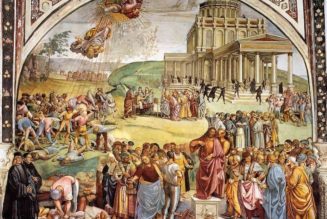By Dr. Jeff Mirus ( bio – articles – email ) | Feb 06, 2020 | In Scripture Series
When we think of St. Paul’s Letter to the Ephesians, we tend to recall only the part which addresses one of our most practical preoccupations, the relationship between husbands and wives. In this twenty-first century after Christ, our culture regards marriage as in RUINS (Restrictive, Unnatural, Incomprehensible, Nugatory, and Senseless). We cannot avoid endless wrangling over the thirteen verses in Ephesians that deal with it. We ignore the 118 verses which precede Paul’s comments on it (1:1—5:21), along with most of the small number of verses in the conclusion which follows (cf. 6:10-20). This is a huge mistake.
The whole point of the letter is to explain to the new Christians in Ephesus what it means that they, as Gentiles, have been incorporated into God’s eternal plan and made heirs of His kingdom in Christ. The immeasurable, staggering greatness of this plan is announced in the first chapter. Paul is in prison (cf. 3:1), and he wants the Ephesians to be aware of this “mystery of [God’s] will, according to his purpose which he set forth in Christ as a plan for the fulness of time, to unite all things to him, things in heaven and things on earth” (1:9-10).
One problem in grasping the purpose of the letter is that its subject matter is so exalted. Another more practical problem is that St. Paul typically begins his letters with long sentences in which his greeting is encompassed in sweeping acknowledgements of the purposes and glory of God. Unfortunately, this breeds a slovenly habit in those who read. Accustomed to what we regard as incidental “high” language in the first few verses, we fail to notice that in Ephesians this exaltation seems to continue through the first two-thirds of the letter, at least until we get into chapter 5 and even, though increasingly in moral terms, right up until verse 21.
It is there that the cumulative exaltation ceases and we arrive at the concrete human condition of marriage. Full stop. Breathe.
But St. Paul has not given us leave to stop and breathe, nor to settle on this part as if it is fundamentally different from the whole.
Reality sets in
I have read the Bible all the way through perhaps a half-dozen times, and have read or heard most of the passages in Ephesians probably a score of times or more, and yet it was not until I began preparing this commentary—reading each chapter several times on its own and struggling a bit to get the gist of all the exalted language—that my internal clock (the one that chimes “Rush, rush, rush; not practical; move on!”) slowed down enough to see the point that needed to be made. There are many sublime passages which I will not quote, because few readers tarry over long offset quotations. Instead, the best thing here will be to summarize it. Then each reader can go back and verify.
Think of how much more difficult this was before Scripture was divided into chapters and verses for ease of reference, and ease of reading in bite-sized pieces. In chapter 1, having announced the Divine plan, Paul prays that God will give the Ephesians a spirit of wisdom so that they will know the hope to which He has called them. That hope is the risen Christ, at the right hand of the Father, “far above all rule and authority and power and dominion, and above every name that is named, not only in this age but also in that which is to come” (1:21). Moreover, the Father “has put all things under his feet and has made him the head over all things for the Church, which is his body, the fullness of him who fills all in all” (1:22-3).
Remember this suggestion that Christ’s headship is for the Church. We will see two similar references as the letter sweeps along. But now, in chapter 2, Paul wants the Ephesians, as Gentiles, to know that they too have been made alive in Christ, though they were dead through sin. Thus the old way of living must give way to the grace of Christ, for “by grace you have been saved through faith”, which is “the gift of God” (2:5,8). Paul reminds them of their former condition—that as Gentiles (non-Jews) they were not only in sin but cut off even from the promises, “having no hope and without God in the world” (2:11-12). But now they too have been brought near in the blood of Christ, for now God has made “one new man in place of the two”, since all are to be reconciled to God through the cross, with access in the Spirit to the Father.
This is a good place to drop one of the better quotations, so everyone can see the magnitude of what Paul is trying to communicate:
So then you are no longer strangers and sojourners, but you are fellow citizens with the saints and members of the household of God, built upon the foundation of the apostles and prophets, Christ Jesus himself being the cornerstone, in whom the whole structure is joined together and grows into a holy temple in the Lord; in whom you also are built into it for a dwelling place of God in the Spirit. [2:19-22]
Slow down and savor this. It is not just ornate language. It is an all-encompassing vision of reality, the ultimate, eternal reality into which you and I are now incorporated by grace.
Paul’s particular mission
In chapter 3, Paul (again, in prison) proceeds to explain his own role. If the Ephesians know his story, they will know he has been given a special insight into the mystery of Christ, which has been made known in this generation but not in the ages that came before. Thus, they should not lament over his sufferings, for he is telling them that the Gentiles are co-heirs with the Jews and members of the same body, and that he himself has been chosen to make this known to them.
Accordingly, he prays for them that they may grasp this great mystery, so that, “rooted and grounded in love”, they may “have power to comprehend with all the saints what is the breadth and length and height and depth, and to know the love of Christ which surpasses knowledge”. He wants them to “be filled with all the fullness of God” (3:17-19). This brings us to the second of the three enormous references to the Church. To God, Paul exclaims, “be glory in the Church and in Christ Jesus to all generations, for ever and ever. Amen” (3:21). The Church, then, is to be a comprehensive manifestation of the glory of God.
In chapter 4, Paul descends a little from the heights to emphasize what all this means in terms of how the Ephesians must live: “[T]o walk in a manner worthy of the calling to which you have been called” (4:1)—that is, with lowliness, meekness, patience, forbearance in love, and maintaining the unity of the Spirit in the bond of peace (4:2-3). For there is one body and one Spirit, and the Ephesians have been called to one hope, “one Lord, one faith, one baptism, one God and Father of us all, who is above all and through all and in all” (4:4-7).
But all of this leads Paul inescapably to a certain amount of precise theological and moral instruction. He explains the descent of Christ into the “lower parts of the earth” and his ascent “far above all the heavens, that he might fill all things”, so that he could give gifts to men. His primary gifts were that some should be apostles, others prophets, others evangelists, and also pastors and teachers, “to equip the saints for the work of ministry, for building up the body of Christ” (4:11-12). Again, this is the Church. But here it leads immediately back to his cosmic theme, for this work has been set in train “until we all attain to the unity of the faith and of the knowledge of the Son of God, to mature manhood, to the measure of the stature of the fulness of Christ” (4:13).
This is necessary, Paul says, so that “we may no longer be children, tossed back and forth and carried about with every wind of doctrine, by the cunning of men, by their craftiness in deceitful wiles” (4:14). Rather:
Speaking the truth in love, we are to grow up in every way into him who is the head, into Christ, from whom the whole body, joined and knit together by every joint with which it is supplied, when each part is working properly, makes bodily growth and upbuilds itself in love. [4:15-16]
Notice the strong connection here between truth and love, which lead to growth and development into the possession of ultimate reality through the Church.
The practical side
Now, at last, Paul turns his attention squarely to moral issues. In the second half of chapter 4, he states clearly that a change in life is required, because “you must no longer walk as the Gentiles walk, in the futility of their minds” (4:17), which are darkened and alienated from the life of God owing to hardness of heart. The Gentiles have “given themselves up to licentiousness, greedy to practice every kind of uncleanness” (4:19). This is contrary to Christ, so they must “put off the old man that belongs to your former manner of life…and put on the new man, created after the likeness of God” (4:22-24). Finally, then, with two-thirds of the letter written, Paul begins to set forth the rules of Christian life:
- Put aside falsehood; speak the truth.
- If angry, do not sin.
- Do not steal; engage in honest work.
- Avoid evil talk.
- Do not “grieve the Holy Spirit of God”.
- Put away all bitterness, wrath, anger, clamor, and malice.
- Be kind, tenderhearted, forgiving “as God in Christ forgave you” (4:32).
He goes on in chapter 5 to stress the need for purity: “[I]mmorality and all impurity or covetousness must not even be named among you, as is fitting among saints” (5:3). No one who is guilty of these things “has any inheritance in the kingdom of God” (5:5). “Look carefully”, Paul warns, “how you walk, not as unwise men but as wise, making the most of the time, because the days are evil” (5:15). Far from any sort of moral license, make “melody to the Lord with all your heart, always and for everything giving thanks in the name of Our Lord Jesus Christ to God the Father” (5:19-20).
It is in this moral context that St. Paul explains what Christian marriage means, in comparison to pagan ways. This is clearly part of the practical formation of the Ephesians, and of course the family is foundational. The marriage section begins with the exhortation to all Christians to “be subject to one another out of reverence to Christ” (5:21). Paul then explains that wives are to be subject to their husbands, as to the Lord, because the husband is head of the wife as Christ is of the Church (5:22-4). In the same way, husbands are to love their wives as Christ loved the Church and gave himself up for her. As with Christ’s love of the Church, which he takes to himself as His mystical body, husbands should love their wives as they do their own bodies, nourishing and cherishing their wives “as Christ does the Church” (5:25-30).
It is here that we get our third special reference to the Church, which once again indicates its unique position in God’s eternal plan. In comparing a husband’s sacrificial love of his wife to Christ’s love of the Church, for which he gave Himself up that he might sanctify her, St. Paul concludes that marriage “is a great mystery”. And he clarifies: “I mean in reference to Christ and the Church” (5:32).
Parse this as you will, it is difficult, without benefit of modern distortions, to take offense at the spiritual and psychological depth of this reclamation of marriage from paganism. Of course, we like to speak in terms of the “empowerment” of women now, but as a corrective we must read again Ephesians 4:2-3 (which I mentioned earlier) where Paul enjoins the Ephesians to “walk in a manner worthy of your calling…with all lowliness and meekness, with patience, forbearing one another in love, eager to maintain the unity of the Spirit in the body of peace.” Empowerment is not a Christian concept.
St. Paul speaks instead of sacrificial love, honor and respect, also recognizing the very real differences in the relational characteristics of men and women. Thus there are different accents in their union. But a clear-headed woman will be made more whole by a husband who sacrifices himself out of love for her; and a clear-headed man will be made more whole by a woman who respects and treasures his familial leadership. Is it not precisely the lack of these engraced dispositions which, on both sides, have turned marriage in our time into a desert, a wasteland? In the first paragraph I offered my own acronym: RUINS.
Conclusion
Ephesians is a short letter, but it is so deep that it cannot be quickly and superficially unpacked to any real advantage. It demands our full attention, and our constant meditation on the fullness of Christ, who must be all in all. To round out the letter, however, it is worth noting that St. Paul also comments on the relationship between children and parents, from which we can still learn, but will probably easily understand; and also on the relationship between slaves and masters, from which we ought to learn, but will not easily understand.
In any case, Paul’s conclusion is logical. His point is that we are called to new life in Christ, and that to take up and survive in our calling we must put on the whole armor of God, not just part of it. We may not judge what is useful according to our own lights. Perhaps Paul’s closing is the best possible commentary on the letter as a whole:
Therefore take the whole armor of God, that you may be able to withstand in the evil day, and having done all, to stand. Stand therefore, having girded your loins with truth, and having put on the breastplate of righteousness, and having shod your feet with the equipment of the gospel of peace; besides all these, taking the shield of faith, with which you can quench all the flaming darts of the evil one. And take the helmet of salvation, and the sword of the Spirit, which is the word of God. [6:11-17]
New Testament Series:
Previous: Galatians: The radical shift from Judaism to Christianity<!—
Next: Ephesians: The remarkable letter that just happens to mention husbands and wives—>
Sound Off! CatholicCulture.org supporters weigh in.
All comments are moderated. To lighten our editing burden, only current donors are allowed to Sound Off. If you are a donor, log in to see the comment form; otherwise please support our work, and Sound Off!

There are no comments yet for this item.









